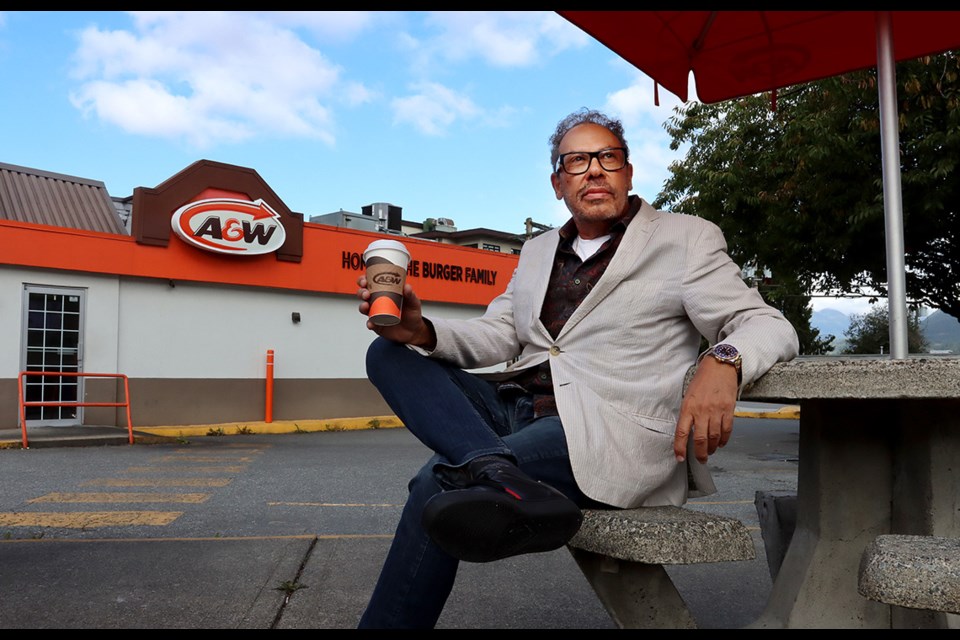Port Moody’s burger baron wants to get into the building business.
But whether Roger Milad’s new aspiration comes at the expense of his A&W drive-thru on St. Johns Street could be a sticking point.
Milad has operated the little restaurant that services most if its customers while they’re just passing through in their vehicles since 1998.
He also owns the A&W at Coquitlam’s Pinetree Village as well as several other establishments after learning the business from the ground up as a kid flipping patties and then working his way into management and eventually ownership.
But when an opportunity came up several years ago to buy the Port Moody property where the chain’s smallest outlet is situated, as well the old Rocky Point Taphouse next door, Milad jumped at it.
Now he wants to realize their full potential.
Recently, though, several councillors balked at Milad's vision for the two lots.
While they loved his proposal to construct a six-storey mixed-use project with a combination of strata and 30 rental units — half of which would be available at below market rates — along with commercial spaces at street level and offices on the second floor, they weren’t so enamoured with its accommodation to continue the drive-thru burger restaurant.
In the feedback councillors provided to Milad during a meeting of Port Moody’s city initiatives and planning committee, they cited concerns about cooking smells seeping into the residential units above, along with the safety and comfort of pedestrians who would have to navigate past the drive-thru’s entrance and exit driveways as well the one to access the building’s underground parking garage.
Also, said Coun. Diana Dilworth, the optics of allowing a drive-thru in the face of the city’s commitment to its climate action plan to reduce greenhouse gases might not send the right message that a big part of that plan reducing car dependency.
While existing drive-thru’s in Port Moody have been grandfathered in, the city’s zoning bylaws haven’t allowed new ones to be built for several years.
Port Moody’s assistant manager of development Wesley Woo said including a drive-thru in Milad’s project would require council’s approval as a non-conforming use.
Milad said drive-thru’s provide an important service to people on the go and even if they’re regulated away, customers will likely turn to the convenience of ordering in from delivery services like Skip the Dishes and Uber Eats.
“Some people can’t get out to eat in a restaurant,” Milad told the Tri-City News.
He said unlike his current, tiny restaurant, his new establishment would have plentiful indoor seating as well as outdoor patio spaces.
Traffic to the drive-thru windows would be managed with double ordering lanes so cars don’t spill onto the street or block sidewalks.
And odours would be controlled by a sophisticated HVAC system that absorbs smells, adding restaurants are commonly found on the ground floors of residential developments, including several nearby.
Milad said his passion for the project — his first attempt at development — is driven by a desire to help young people gain a foothold in their community whether it’s with their first job manning the grill or order counter in his restaurant to being able to afford a place where they can live and work in the same space.
He also plans to launch a mentoring service in the offices on the second floor, where young entrepreneurs can connect and learn from established business people like himself.
Carola Alder of CityState Consulting Group, who’s been working with Milad to help him realize his vision, said the mix of uses is a natural evolution for St. Johns Street as Port Moody densifies and demand grows for more commercial enterprises and offices within easy walking distance of where people are living.
“A lot of it has to do with activating the street front,” she said.
“Right now, a lot of people don’t walk because of a lack of amenities or proximity to other dense developments with the amenities they want.”
Milad said refinement of his proposal will continue before it returns to council for a more formal appraisal, but he admits, reinventing suburbia to become more urban is a lot more challenging that just building homes in taller buildings.
“I want to do something different,” he said. “That’s where my heart is.”



